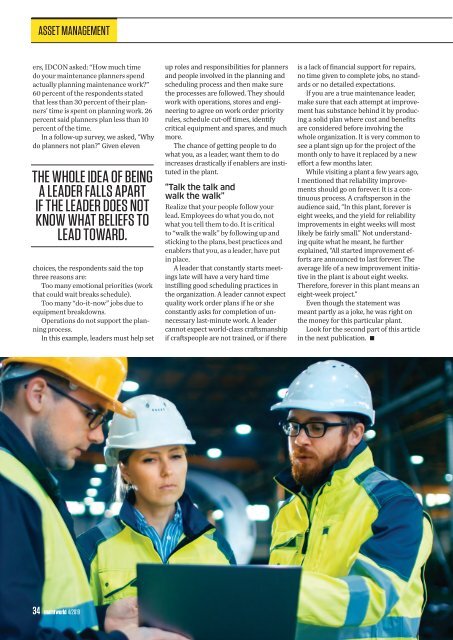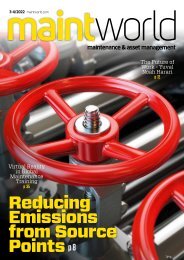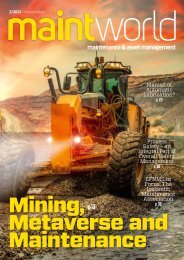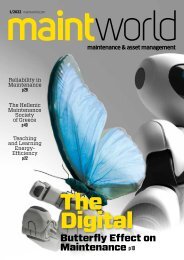Maintworld 4/2019
Machine Learning – Not a Gold-Plated Silver-Bullet Solution to Operational Woes // A Data-Driven Approach to Online Monitoring of Roller Bearings // Using Ultrasound to Enhance Energy Efficiency
Machine Learning – Not a Gold-Plated Silver-Bullet Solution to Operational Woes // A Data-Driven Approach to Online Monitoring of Roller Bearings // Using Ultrasound to Enhance Energy Efficiency
Create successful ePaper yourself
Turn your PDF publications into a flip-book with our unique Google optimized e-Paper software.
ASSET MANAGEMENT<br />
ers, IDCON asked: “How much time<br />
do your maintenance planners spend<br />
actually planning maintenance work?”<br />
60 percent of the respondents stated<br />
that less than 30 percent of their planners’<br />
time is spent on planning work. 26<br />
percent said planners plan less than 10<br />
percent of the time.<br />
In a follow-up survey, we asked, “Why<br />
do planners not plan?” Given eleven<br />
THE WHOLE IDEA OF BEING<br />
A LEADER FALLS APART<br />
IF THE LEADER DOES NOT<br />
KNOW WHAT BELIEFS TO<br />
LEAD TOWARD.<br />
choices, the respondents said the top<br />
three reasons are:<br />
Too many emotional priorities (work<br />
that could wait breaks schedule).<br />
Too many “do-it-now” jobs due to<br />
equipment breakdowns.<br />
Operations do not support the planning<br />
process.<br />
In this example, leaders must help set<br />
up roles and responsibilities for planners<br />
and people involved in the planning and<br />
scheduling process and then make sure<br />
the processes are followed. They should<br />
work with operations, stores and engineering<br />
to agree on work order priority<br />
rules, schedule cut-off times, identify<br />
critical equipment and spares, and much<br />
more.<br />
The chance of getting people to do<br />
what you, as a leader, want them to do<br />
increases drastically if enablers are instituted<br />
in the plant.<br />
“Talk the talk and<br />
walk the walk”<br />
Realize that your people follow your<br />
lead. Employees do what you do, not<br />
what you tell them to do. It is critical<br />
to “walk the walk” by following up and<br />
sticking to the plans, best practices and<br />
enablers that you, as a leader, have put<br />
in place.<br />
A leader that constantly starts meetings<br />
late will have a very hard time<br />
instilling good scheduling practices in<br />
the organization. A leader cannot expect<br />
quality work order plans if he or she<br />
constantly asks for completion of unnecessary<br />
last-minute work. A leader<br />
cannot expect world-class craftsmanship<br />
if craftspeople are not trained, or if there<br />
is a lack of financial support for repairs,<br />
no time given to complete jobs, no standards<br />
or no detailed expectations.<br />
If you are a true maintenance leader,<br />
make sure that each attempt at improvement<br />
has substance behind it by producing<br />
a solid plan where cost and benefits<br />
are considered before involving the<br />
whole organization. It is very common to<br />
see a plant sign up for the project of the<br />
month only to have it replaced by a new<br />
effort a few months later.<br />
While visiting a plant a few years ago,<br />
I mentioned that reliability improvements<br />
should go on forever. It is a continuous<br />
process. A craftsperson in the<br />
audience said, “In this plant, forever is<br />
eight weeks, and the yield for reliability<br />
improvements in eight weeks will most<br />
likely be fairly small.” Not understanding<br />
quite what he meant, he further<br />
explained, “All started improvement efforts<br />
are announced to last forever. The<br />
average life of a new improvement initiative<br />
in the plant is about eight weeks.<br />
Therefore, forever in this plant means an<br />
eight-week project.”<br />
Even though the statement was<br />
meant partly as a joke, he was right on<br />
the money for this particular plant.<br />
Look for the second part of this article<br />
in the next publication.<br />
34 maintworld 4/<strong>2019</strong>

















